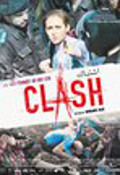
Directed by
Mohamed Diab
98 minutes
Rated M
Reviewed by
Bernard Hemingway

Clash
Synopsis: During a violent street protest in Cairo in 2013, a police riot van fills with people, some from opposing factions, some merely caught up in the chaos.
There is no doubt that director Mohamed Diab has created a brilliantly effective metaphor for a country at war with itself. The question for cinema-goers is going to be do I want to experience the results?
Shot entirely within the confines of the police van with the world at large only intermittently visible through the small barred windows, Clash puts us inside a claustrophobic, near panic-stricken, anger-filled pandemonium. Shooting with only a hand-held camera and using natural sound, the film is both visually and aurally discomfiting as gradually the van fills with prisoners some of whom support the military, some who are members of the opposing Muslim Brotherhood and some who are merely observers like a couple of journalists and an old man and his granddaughter.
Diab doesn’t exploit his typology of characters programmatically. His concern is to show the human situation: of prejudice fueling hostility, of violence begetting violence and its senseless consequences. Of course, the film will resonate most with a native audience but the universal meaning is plain to see.
Whilst the metaphor is potent and Diab’s execution of it impressively skilled, on the downside, bar a brief interlude when the van’s occupants must address the call of nature, Diab puts us in the middle of a continuous cacophony. Like those occupants, unsurprisingly, we as an audience cannot help but find ourselves wishing to be somewhere else. As with the 2005 Israeli movie, Lebanon, which was shot entirely within the confines of an army tank, had the individual characters been more closely engaged with, this would have been a less insistent reaction.

Want more about this film?


Want something different?




